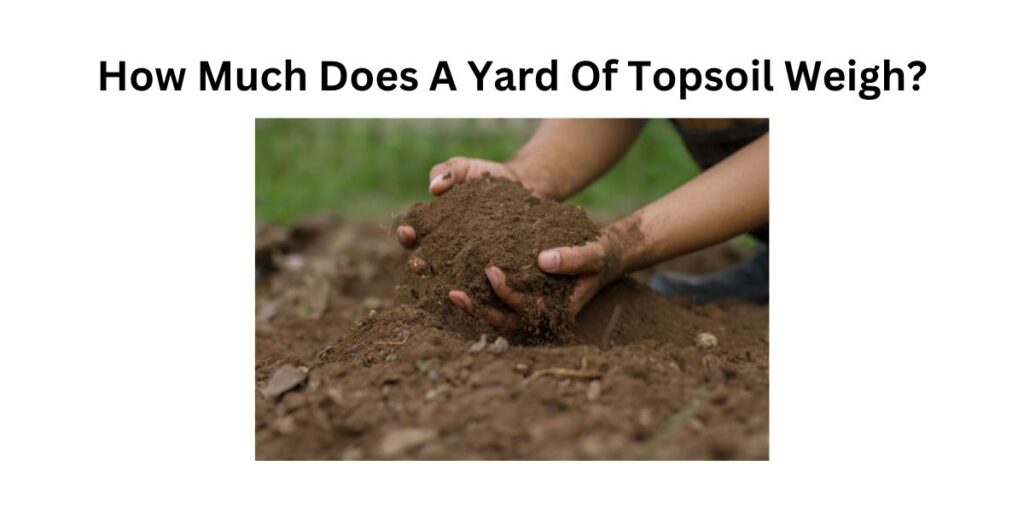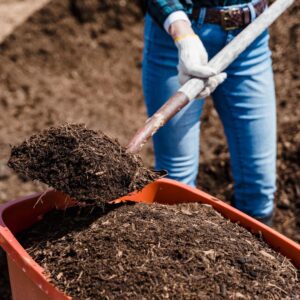If you’re planning to start a garden or landscaping project, you may be wondering how much does a yard of topsoil weigh? Knowing the weight of topsoil is essential for determining how much soil you need to order and how much it will cost. The weight of topsoil varies depending on the type of soil and its moisture content, so it’s important to have accurate information before making your purchase.
One cubic yard of topsoil weighs approximately 1,080 pounds, but this can vary depending on the soil’s moisture content and any debris that may be present. It’s important to note that topsoil is sold by volume, not weight, so knowing the weight can help you determine how much soil you need to order. Additionally, if you plan to have the topsoil delivered, knowing the weight can help ensure that your delivery vehicle can safely transport the load.
When ordering topsoil, it’s important to consider the depth of soil you need for your project. A yard of topsoil can cover 324 square feet of soil with a depth of one inch, or 100 square feet with a depth of three inches. Understanding how much topsoil you need and how much it will weigh can help you plan your project and ensure that you have the right amount of soil for your needs.
Understanding Topsoil Weight
When it comes to gardening or landscaping, topsoil is one of the most important components. It is the uppermost layer of soil and is rich in nutrients that are essential for plants to grow. But how much does a yard of topsoil weigh? Understanding the weight of topsoil can help you determine how much you need for your project and how much it will cost.
The weight of a yard of topsoil can vary depending on several factors, including its composition, moisture content, and any debris or rocks it may contain. On average, one cubic yard of topsoil weighs approximately 1,080 pounds. However, this weight can range from 1,400 to 2,000 pounds or more, depending on the specific conditions.
If you are buying topsoil by the truckload, it is important to know that a cubic yard equals 27 cubic feet. This means that a yard of topsoil is a significant amount of soil and can cover a large area. To determine how much topsoil you need for your project, you will need to measure the area you want to cover and calculate the volume in cubic feet.
Here are some common measurements and the corresponding amount of topsoil you will need:
| Area to Cover | Depth of Topsoil | Amount of Topsoil Needed |
|---|---|---|
| 100 square feet | 3 inches | 0.75 cubic yards |
| 1,000 square feet | 3 inches | 7.5 cubic yards |
| 1/4 acre (10,890 square feet) | 6 inches | 81 cubic yards |
Keep in mind that these are just estimates and the actual amount of topsoil you need may vary depending on the specific conditions of your project. It is always a good idea to order a little extra topsoil to account for any discrepancies or unexpected issues that may arise.
Factors That Affect Topsoil Weight
When it comes to determining the weight of a yard of topsoil, there are several factors to consider. Here are some of the most important:
Moisture Content
The amount of moisture in the topsoil is one of the biggest factors that can affect its weight. Dry topsoil will weigh less than wet topsoil because water adds significant weight. For example, a cubic yard of dry topsoil may weigh around 1,080 pounds, while the same amount of wet topsoil could weigh up to 3,000 pounds.
Organic Matter
Topsoil that contains a lot of organic matter, such as compost, will weigh more than topsoil that is mostly sand or clay. This is because organic matter is denser and heavier than sand or clay particles. So, if you’re looking for a lightweight topsoil, you’ll want to choose one that has less organic matter.
Particle Size
The size of the particles in the topsoil can also affect its weight. Topsoil that has a lot of small particles, such as silt, will weigh more than topsoil that has larger particles, such as sand. This is because smaller particles are more compact and can fit more tightly together, making the topsoil denser and heavier.
Debris
Finally, the presence of debris in the topsoil can also affect its weight. Rocks, sticks, and other debris can add significant weight to the topsoil, so if you’re looking for a lightweight option, you’ll want to choose a topsoil that has been sifted to remove any debris.
Overall, it’s important to keep in mind that the weight of a yard of topsoil can vary greatly depending on these and other factors. So, if you’re looking to purchase topsoil, be sure to ask about its weight and factor in any of these variables that may affect it.
Calculating the Weight of a Yard of Topsoil
If you’re planning to purchase topsoil for your landscaping project, it’s important to know how much it weighs. This information will help you determine how much you need to order and how much it will cost. The weight of a yard of topsoil can vary depending on different factors, but there are some general guidelines you can follow to calculate it.
The weight of a yard of topsoil is typically between 1,500 and 3,000 pounds. However, this weight can vary depending on the type of topsoil and the amount of moisture, debris, and rocks it contains. To calculate the weight of a yard of topsoil, you need to know its density, which is measured in pounds per cubic yard.
Here’s a simple formula you can use to calculate the weight of a yard of topsoil:
| Step | Formula |
|---|---|
| 1 | Measure the length, width, and depth of the area you need to fill in feet. |
| 2 | Multiply the length, width, and depth together to get the cubic feet. |
| 3 | Divide the cubic feet by 27 to get the cubic yards. |
| 4 | Multiply the cubic yards by the density of the topsoil in pounds per cubic yard. |
For example, if you need to fill an area that is 10 feet long, 5 feet wide, and 0.5 feet deep with topsoil that has a density of 1,500 pounds per cubic yard, you would calculate the weight as follows:
- Step 1: 10 feet x 5 feet x 0.5 feet = 25 cubic feet
- Step 2: 25 cubic feet ÷ 27 = 0.93 cubic yards
- Step 3: 0.93 cubic yards x 1,500 pounds per cubic yard = 1,395 pounds
So, in this example, a yard of topsoil would weigh approximately 1,395 pounds.
Keep in mind that this formula provides an estimate of the weight of a yard of topsoil. The actual weight may vary depending on the factors mentioned earlier. If you’re unsure about how much topsoil you need or how to calculate its weight, it’s always a good idea to consult with a professional landscaper or supplier.
How to Handle and Transport Topsoil
Transporting topsoil can be a daunting task, especially if you are dealing with a large quantity. Here are some tips to help you handle and transport topsoil:
- Before you start, make sure you have the right equipment. You will need a shovel, a wheelbarrow, and a truck or trailer to transport the topsoil.
- When loading the topsoil, make sure to distribute the weight evenly. This will help prevent the soil from shifting during transport.
- If you are using a truck, cover the bed with a tarp to prevent the soil from blowing away during transport.
- When unloading the topsoil, make sure to do it in a safe and controlled manner. Use caution when tipping the wheelbarrow or truck bed to prevent the soil from spilling or causing injury.
- It’s important to note that wet topsoil can be much heavier than dry topsoil. If you are dealing with wet soil, make sure to take this into consideration when calculating the amount of soil you can transport at once.
Overall, transporting topsoil can be a challenging task, but with the right equipment and precautions, it can be done safely and efficiently. Remember to take your time and be careful when handling and transporting topsoil to prevent injury or damage to your equipment.
Conclusion
Now that you know how much a yard of topsoil weighs, you can make informed decisions when purchasing it for your landscaping or gardening needs. Keep in mind that the weight can vary depending on the moisture content and debris in the soil, so it’s important to factor in those variables when estimating how much topsoil you’ll need.
When calculating how much topsoil you’ll need, remember that one cubic yard equals 27 cubic feet. Use this conversion factor to determine how much topsoil you’ll need for your project.
Additionally, consider the cost of topsoil when planning your project. The cost can range from $10 to $50 per yard, so it’s important to budget accordingly. You can also save money by purchasing topsoil in bulk or by using compost and other organic materials to improve the quality of your soil.
Overall, understanding how much a yard of topsoil weighs is an important factor in successful landscaping and gardening projects. With this knowledge, you can make informed decisions about how much topsoil you need and how much it will cost, ultimately leading to a beautiful and healthy outdoor space.







